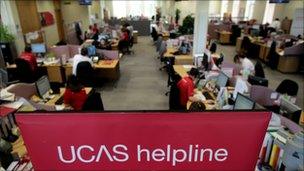Record numbers fail to get university place
- Published

University admissions helpline workers have answered thousands of calls
Nearly 190,000 applicants to UK universities failed to get a place this year, a higher proportion than ever before, Ucas figures reveal.
After clearing, 188,697 applicants were unplaced, up from 139,520 last year.
While 22% of hopefuls missed out in 2009, this rose to 27% in 2010
The head of Ucas is warning that a "massive influx" of applicants trying to avoid an expected rise in fees in 2012 will further increase pressure on university places next year.
Tuition fees, currently limited to 拢3,290 in England, Wales and Northern Ireland, are expected to roughly double if the government adopts reforms proposed by Lord Browne's review of higher education funding, published last week.
He suggested completely removing the current cap on fees, with incentives for universities to keep them below 拢7,000.
The government announced a 40% cut to higher education funding in its Spending Review on Wednesday, saying it expected the income from fees to fill the gap.
Ucas chief executive Mary Curnock Cook told the Times that she expected demand to outstrip supply again next year, and called on the government to clarify when fee rises would take effect.
"As soon as there's uncertainty you will get a massive influx of applications," Ms Curnock Cook said.
Pam Tatlow, chief executive of the university think tank Million+, called on the government to fund "significantly more" places during the transition to increased fees.
"It is entirely predictable that there will be a big increase in applications to university next year as would-be students scramble to secure places before much higher fees are introduced," she said.
Last time fees were raised, in 2006, "there was no cap on student numbers and there were not 190,000 applicants who had missed out on places the preceding year", she added.
The National Union of Students accused Lord Browne of "ramping up the costs to students to fill a black hole created by self-defeating cuts".
"The door to the skills and opportunities that university offers looks set to be slammed in the face of yet more applicants next year and for many years to come," said its president, Aaron Porter.
However, Nicola Dandridge, chief executive of the vice-chancellors' umbrella group Universities UK, said she expected a "small increase" for entry in 2011.
She also said that she believed the numbers of students who were suitably qualified and in a position to go to university but failed to get a place to be much smaller than the 190,000 classed as eligible for clearing.
Those failing to get places include prospective students who applied late, did not get the necessary grades, who may have decided against university study but not withdrawn their applications.
Of a total of 688,310 applicants, 479,057 were accepted.
In addition to the 188,697 who failed to get a place in clearing, another 18,000 withdrew their applications.
This year, 46,248 students found a place through clearing, slightly down from 47,188 last year.
The number of students from England, Wales, Scotland and Northern Ireland who secured placed declined slightly, by 0.2%, while the number of EU students accepted onto courses rose 7.2%.
The number of planned new university places for this September was halved to 10,000 because of government spending cuts, but nearly 55,000 more people applied than in 2009.
The rise in demand is partly attributed to concerns about employment prospects, with both school leavers and mature students wanting to improve their qualifications in a competitive jobs market.
There was also a rise in the numbers reapplying, suggesting disappointed 2009 applicants also boosted demand.
Universities Minister David Willetts said: "In a year of unprecedented demand for higher education funding we kept our commitment to fund an additional 10,000 student places. There were more first year places this year in English universities than ever before."